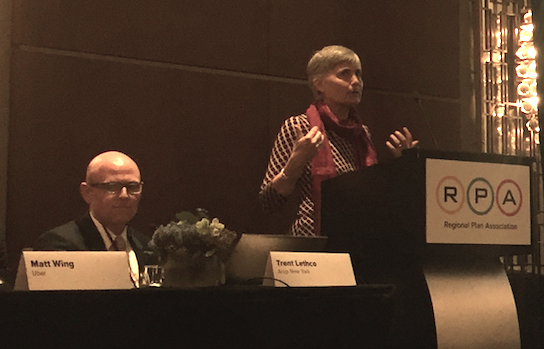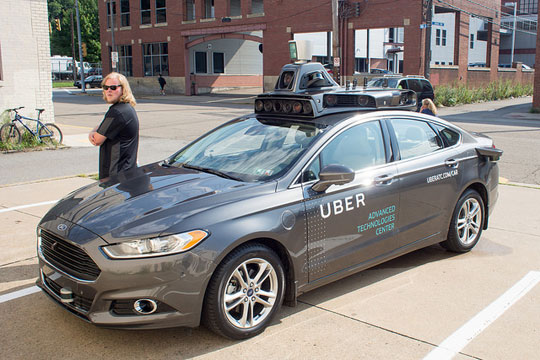Self-driving cars have the potential to cut traffic, reduce private car ownership, and free up scarce street space in the process. It's either that or a nightmare scenario, says Zipcar founder Robin Chase, who worries that if cities don't play their hand well, the introduction of autonomous vehicles will lead to more pollution, more congestion, and more demand for parking.
Chase made her case on a panel alongside auto industry representatives at the Regional Plan Association's annual assembly last Friday.

Driverless cars may not be ready for city streets in the immediate future, but some of the world's biggest companies are betting on them, and Chase says cities will be better off if mayors band together instead of negotiating solo with each corporation.
"When a city goes one-by-one, they’re negotiating with these huge multi-national and global companies, and there’s only so much leverage you have, which is an inadequate amount," she said. "Now is the time where there aren’t a lot of stakeholders around autonomous vehicles, and we need to tee up the right behaviors and use-cases that we want before behaviors and use-cases that we don’t want happen in our cities."
Ultimately, Chase said local governments should require autonomous vehicles operating in dense cities to be part of "shared fleets," as opposed to the personal car ownership model that dominates today. An insistence on shared fleets will ensure that the vehicles, which are likely to be prohibitively expensive for most people, are safe, well-maintained, accessible, and space-efficient.
Chase identified four steps she believes governments must take to guarantee the transition to autonomous vehicles unfolds on terms that are favorable to cities and urban residents.
Create a level playing field. "We need this to ensure competition so that the local guy can still compete against the big guys," she said, "so that we can use roads efficiently, and so that new start-ups that we haven’t even thought of today can actually get into the system and we can evolve and improve."
Charge for the space cars occupy. Revenue streams like gas taxes and car registration fees will shrivel in the autonomous car future, but operators of driverless cars should still pay for the public costs they impose. Chase says cities need to have "use-based fees" based on vehicles' fuel-type and space-efficiency. That includes congestion pricing and charges for autonomous vehicles that aren't carrying any passengers. "We have to address these issues," she said. "They’re fundamental problems we have with cars today."
Mandate electric fleets. Companies currently exploring autonomous vehicle technology are "agnostic" about whether the vehicles will be gas-powered or battery-powered, said Chase, but cities should require all shared fleets -- meaning taxis, for-hire vehicles, and buses -- to run on electric power by 2025. "It actually has nothing to do with climate change, it has to do with air quality in our cities," she said.
Be prepared. If the era of mass private car ownership is going to be replaced by a more spatially-efficient era of shared autonomous cars, those cars will have to be networked. And street infrastructure like traffic signals will be integral to making that network function, says Chase. She believes it's imperative for cities to be ready and have the necessary public infrastructure for networked vehicles installed before autonomous vehicles become a mass market product.






